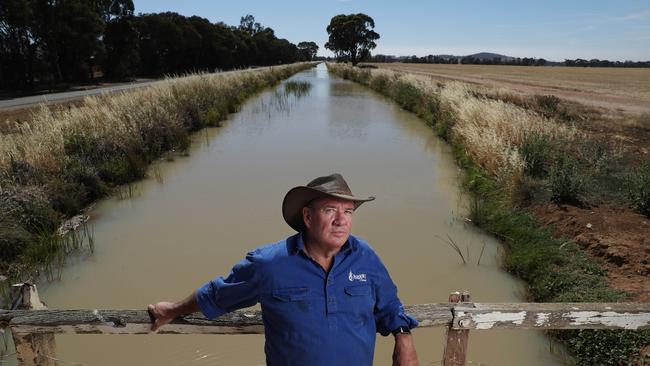Coronavirus: We need more water to grow food in this crisis, say Murray-Darling farmers
Farmers have called for more water to be released to grow food in the Murray-Darling basin, fearing a shortage of wheat and rice.

Irrigation farmers have called for more water to be released to grow food in the Murray-Darling Basin, saying the nation risks a squeeze on staples such as rice and wheat.
The move comes amid an international tightening of food supply and higher prices of commodities, as a number of countries including Vietnam, Russia and Ukraine move to limit exports to ensure their domestic supplies as the COVID-19 crisis takes hold.
Irrigation organisations representing 6000 farmers wrote to Scott Morrison on Monday, saying the zero water allocations farmers in the south Murray-Darling Basin had suffered for two years meant Australia had virtually no rice crop and wheat had to be imported.
The irrigators say there is now sufficient water in the main reservoirs to provide allocations.
“Our rice farmers are unable to plant their crops because they have not been allocated any water from the recently flooded Murray River,” the organisations wrote.
“Until two years ago, the Southern Basin’s irrigated agriculture was producing 60 per cent of the nation’s food.”
A significant allocation of water to irrigation farmers would stimulate the economy by approximately $20bn a year, they wrote.
The chairman of Southern Riverina Irrigators, Chris Brooks, said the Murray-Darling Basin Plan, under which the federal government has bought back about 30 per cent of water from farmers to channel to environmental flows, was counter-productive.
“The dams have sufficient water in them, and they are now chucking that water past us to run out to sea,” Mr Brooks said.
Rabobank senior grain analyst Cheryl Kalisch Gordon said the COVID-19 crisis had led many countries to restrict food exports, driving global rice prices to five-year highs after already short supply in Thailand because of drought. “Vietnam has put a halt on rice exports, and this is consistent with other countries around the world considering their situation,” Dr Kalisch Gordon said, adding Russia and Ukraine had both indicated they were considering their position on grain exports.
“For Australia, I don’t think it’s a food security issue but I do expect there would be upward pressure on pricing.”
Rice has been one of the products in short supply on supermarket shelves, with some retailers forced to limit purchases.
Mr Brooks said while Australians ate 350,000 tonnes of rice a year, Australia grew just 54,000 tonnes of rice in 2019.
“The water has been taken off us. We are no longer growing the commodities that we have always grown in our own backyard,” he told The Australian.
“Other countries are protecting their populations,” he added.
The National Farmers Federation and the federal government have repeatedly insisted Australia faced no food shortages in an effort to calm concerns that have fuelled panic-buying.
“Australian farmers produce enough of life’s essentials to feed 75 million people,” NFF chief executive Tony Maher said.
Water Minister Keith Pitt said: “Irrigated agriculture underpins the Basin economy, and I am committed to working with industry and state governments through these challenging times.”




To join the conversation, please log in. Don't have an account? Register
Join the conversation, you are commenting as Logout